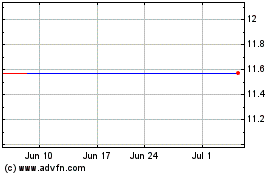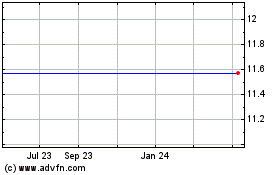By Ben Dummett
BlackBerry Ltd., struggling to revive its moribund smartphone
business, is betting its expertise in mobile security will help
distinguish the company's first Android device from a crowded
field.
BlackBerry expects to start shipping its new Priv later this
month, marking a strategic shift for the fallen tech star. The
company relied on its own operating system and qwerty keyboard to
once dominate the smartphone market by offering secure devices that
made typing and emailing easier for bankers, lawyers and other
professionals.
But as consumers moved on to the sleeker designs and greater
number of apps offered by alternative devices, BlackBerry's market
share has plummeted to a level that is pushing the Waterloo,
Ontario, company to adopt the most widely used smartphone operating
system to attract new customers.
The Priv is meant to stand out among rival Android phones by
incorporating BlackBerry's encryption technology that is still
considered the gold standard for mobile security by many
governments and industries, and its productivity tools such as the
company's unified inbox that brings together a user's email, text
and other messages in one place. Applying this technology to
Android is significant because BlackBerry had previously indicated
that its own operating system was the best platform for offering
those advantages and a move to Android could undermine that.
The challenge for the Canadian company is convincing consumers
and business to buy a premium-priced phone when today's dominant
smartphone makers Apple Inc. and Samsung Electronics Co. are adding
more security to their latest handsets, and more employers allow
workers to use their personal smartphones on the job, some analysts
and industry executives say.
"The percentage of [Apple] devices under management continues to
increase," among corporations that Mobi Wireless Management Inc.
works with, the company's president, Mitch Black, said. Based in
Indianapolis, Ind., Mobi Wireless offers software that allows
companies to control all components of their corporate networks
from a central point.
BlackBerry has a lot riding on Priv's success. The company has
released three new devices powered by its own operating system
since September 2014, part of an effort to regain business from its
traditional enterprise customers after a move the prior year into
the consumer market fell flat. While BlackBerry has touted the
productivity and security features of these smartphones, the
company's device business remains under pressure. For the quarter
ended Aug. 29, hardware revenue dropped almost 24% from the prior
quarter.
BlackBerry is largely counting on sales of higher margin mobile
security software and services for enterprise customers to reignite
growth. But a profitable handset business would give this strategy
more time to gain traction.
Smartphone markers rely heavily on carriers to sell devices
through the mobile phone companies' retail stores to reach the
broadest audience possible. As BlackBerrys fell out of favor with
consumers, the company lost a lot of this support, further hurting
device sales. BlackBerry says it is regaining carrier confidence.
AT&T Inc. is among BlackBerry's distributors for the Passport
device that was launched in September 2014. And AT&T as well as
Verizon Communications Inc. are among the carriers that offer the
company's Classic smartphone, also introduced last year.
AT&T will sell Priv, but not Verizon, Sprint Corp. and U.S.
Cellular Corp., limiting the potential size of customers for the
device. By comparison, Samsung had support of AT&T, Verizon and
U.S. Cellular among others when it launched its Galaxy S6 Edge
device earlier this year.
Marty Beard, BlackBerry's chief operating officer, declined to
comment on whether any of these carriers would ultimately offer the
phone but said the company plans to announce new distributions
agreements in the near future.
In September, John Chen, BlackBerry's chief executive, said the
lack of social media and entertainment apps many consumers covet
had hindered sales of the company's latest of handsets.
BlackBerry's small share of the global smartphone market--which
stands at less than 1%--deters developers from making applications
that run on BlackBerry's operating system because they can't make
much money from the effort. The Priv won't suffer from that
disadvantage. By using Alphabet Inc.'s Android operating system,
the device comes loaded with the Google Play store, giving users
access to about three times more apps than available on
BlackBerry's current crop of phones.
The device, which offers a 5.4-inch dual-curved screen, also
gives users the option of using a touch screen or slide-out
keyboard for typing.
"Priv will be the answer for former BlackBerry users who miss
the physical keyboard but want more apps," Mr. Chen said in a post
on BlackBerry's official blog.
The Priv, though, faces a crowded field of competitors, with
about 83% of all smartphones powered by Android. To distinguish
itself among this group, BlackBerry has loaded the inside of the
device with new encryption technology to better protect data stored
on the device and guard against tampering of the operating system
by hackers. It also includes an alert system to tell users when
social media apps are tracking their locations.
BlackBerry rivals Samsung, the world's largest seller of Android
devices, and Apple, have also tried to beef up security of their
devices. Apple has made it harder to crack its pass codes by
lengthening the number of digits required to access its phones and
added a security layer to protect a user's documents, photos and
other data. Meanwhile, Samsung's new handsets come with the South
Korean tech giant's Knox security platform that is used to separate
personal and work data to ensure corporate security and employee
privacy.
At $699, the Priv is in some cases more than $100 cheaper than
prices for Samsung's Galaxy S6 Edge and Galaxy S6 Edge + devices,
while it falls between the $649 price for Apple iPhone 6s and $749
for iPhone 6s Plus.
"Why would you swap," when the importance of security for users
has become less clear as more employees use their personal phones
for work, said David McQueen, an analyst at ABI Research.
Write to Ben Dummett at ben.dummett@wsj.com
Subscribe to WSJ: http://online.wsj.com?mod=djnwires
(END) Dow Jones Newswires
November 02, 2015 11:14 ET (16:14 GMT)
Copyright (c) 2015 Dow Jones & Company, Inc.
BlackBerry Ltd. (NASDAQ:BBRY)
Historical Stock Chart
From Mar 2024 to Apr 2024

BlackBerry Ltd. (NASDAQ:BBRY)
Historical Stock Chart
From Apr 2023 to Apr 2024
